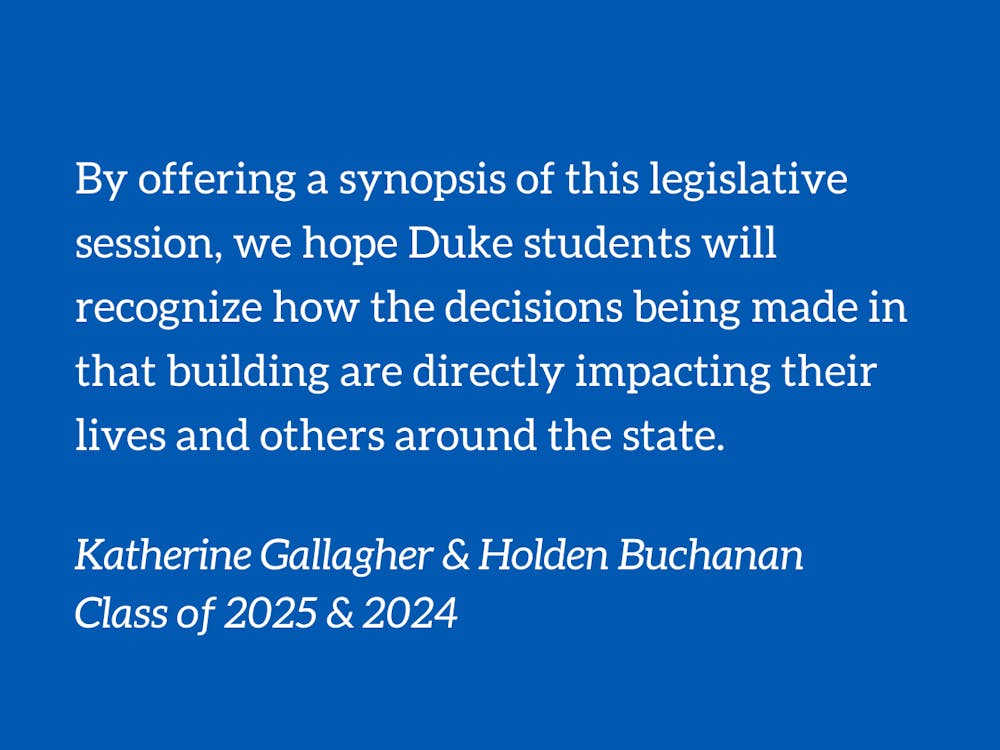As interns who spent their summers at the NC General Assembly, we witnessed the unsettling amount of power wielded by state legislators who proved to be unpredictable and irrational. By offering a synopsis of this legislative session, we hope Duke students will recognize how the decisions being made in that building are directly impacting their lives and others around the state — especially with municipal elections on the horizon.
Abortion Rights
What if we told you that a state legislator’s choice of emojis led to the denial of abortion access to millions of North Carolinians? Just six months after being elected as a representative to North Carolina’s 12th Congressional District — which backed Joe Biden by 23 points and elected her with over 60% of the vote — Tricia Cotham publicly announced her switch to the Republican Party. In her press conference, she recounted how the turning point arose when she faced scrutiny for using the American flag and praying hands emojis on her social media platforms. Her defection gave Republicans a supermajority in the legislature, which allowed a restrictive abortion bill to become law without Gov. Roy Cooper’s signature.
Imagine a friend or a classmate having an unwanted pregnancy. The stress and trauma endured when making such a decision are already unbearable as is. With the passing of the Care for Women, Children and Families Act, Duke students and college students across the state with unwanted pregnancies face the additional strain of having to leave the state — a financially unmanageable option for some. Duke students should be able to make their own decisions about their pregnancies, and our legislature has stripped that right from them.
Voting Rights
After failing to set independent state legislature theory as precedent in the recent U.S. Supreme Court case Moore v. Harper, General Assembly leaders found other ways to consolidate power in the legislature. For example, SB 512: Greater Accountability for Boards/Commissions takes appointment power for various boards and commissions from the governor and gives it to the legislature. SB 749: No Partisan Advantage in Elections works to restructure boards of elections by removing the governor's power to appoint members and break ties.
SB 747: Elections Law Changes, which passed in the Senate and is sitting in the House, will introduce a two-factor authentication process and signature verification for absentee ballots cast by mail, eliminate the three-day grace period for mail-in ballots, and expand who can challenge the eligibility of another voter. We are saddened by the passage of these bills, which diminish the power of the voter and the executive branch while awarding more power to the General Assembly.
Environmental Issues
The legislature is also eradicating critical natural infrastructure and failing to address serious environmental issues. By consuming tap water from your Duke residence hall, you unwittingly ingested PFAS-contaminated water. Per- and polyfluoroalkyl substances (PFAS), also known as “forever chemicals”, are highly toxic fluorinated chemicals that never break down in the environment and have been linked to cancer, hormone disruption, liver and thyroid problems and reproductive and immune system harm, among other negative health effects. Equally alarming, ingesting contaminated fish from the Cape Fear River poses a severe threat to North Carolinians’ health. Two PFAS-related bills — HB 610 and SB 658 — failed to make it through committees, despite the urgent environmental impacts of this pollution.
Additionally, this year’s annual Farm Bill flushes nature's filters down the drain. The N.C. Farm Act of 2023 reclassifies protected wetlands to only those “adjacent to bodies of water.” Thanks to the Home Builders Association, who lobbied for the narrow definition, as many as 2.5 million acres of vital wetlands are open for development in North Carolina. Since 2017, this PAC has emerged as one of the leading donors to state legislators, generously donating over a million dollars to the governing body.
Johns Hopkins University conducted a survey of 1,500 Americans, highlighting the general public’s lack of knowledge and interest in state politics. Of those surveyed, less than 20% could name their state legislators. A third couldn't name their governor. More than half didn't know if their state had a constitution. The lack of media coverage for state politics, especially during such a unique presidential campaigning season, has made many less aware of how state government severely impacts our lives.
Over 17,000 students are enrolled at Duke University, and over 560,000 students are enrolled in North Carolina colleges. The ability to cast a vote isn't just a privilege; it's a responsibility that empowers us to influence the direction of our communities and the policies that impact our lives. It’s also a constitutional right that state legislators are attempting to limit for college students. It is imperative that these legislators are held accountable for their actions and that college students cast their ballots in the upcoming municipal elections this fall.
Katherine Gallagher is a Trinity junior, and Holden Buchanan is a Trinity senior.
Get The Chronicle straight to your inbox
Sign up for our weekly newsletter. Cancel at any time.

